One of the challenges of studying the results of the 2016 presidential election, and its potential for redefining the Republican party and the political landscape more generally, has been to understand the attitudes of voters who backed Donald Trump’s unconventional candidacy. Our past surveys indicate that Trump won the election with the support of traditional Republican issues voters (guns, abortion, de-regulation, Supreme Court nominations), but he also appealed to voters who saw something new in his style and rhetoric. This post reports on one element of the electorate, those who resonated with Trump’s invocation of populist themes of nationalism, mistrust of “experts” and anti-elitism. We examined the relationship between populist attitudes and voter beliefs in statements made during the campaigns.
Populism
Populist politicians are characterized by the use of simple and repetitive language to espouse themes that place blame on political and economic elites, and appeal to the common wisdom of ordinary citizens (Oliver & Rahn, 2016). These politicians also thrive on criticism from more established candidates and from the media as the opposition serves to strengthen their followers’ belief in the populists’ authenticity, while establishing their bona fides as outsiders who speak for the common man (Oliver & Rahn, 2016).
We were interested in studying the role that populist beliefs may have played in the 2016 election and in other aspects of American life. We analyzed a sample of 3,835 members of USC’s nationally representative Understanding America Study internet panel who completed a series of three surveys that began the day after the 2016 election [1]. The surveys included items measuring respondents’ attitudes toward populist themes; their vote in the 2016 election, and a battery of questions assessing belief in claims made by campaigns.
To measure populism, we used a concise 9-item subset of a 14-item populism scale developed by Professor J. Eric Oliver of the University of Chicago and Professor Wendy M. Rahn of the University of Minnesota (2016). The populism scale comprises three types of beliefs: mistrust of expert opinions, national affiliation, and anti-elitism. These subscales measure (a) how much someone trusts the opinions of ordinary people compared to experts and intellectuals, and their sense of the importance of science and facts; (b) how much a person identifies with being American, and (c) whether they feel the system is rigged and they don’t have much influence over what happens in government.
As expected, populist attitudes negatively correlated with household income (Figure 1), with lower income groups scoring higher on populist beliefs.
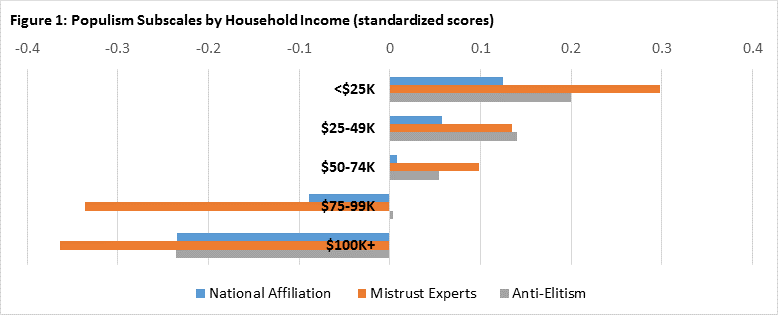
We also found that populist attitudes varied significantly across regions of the United States. We measured highest concentrations of mistrust of science and experts in the northern central region of the U.S, and lowest concentrations in the states bordering the Pacific Ocean. Nationalism also varied significantly by region: we observed lowest intensities in the mountain and Pacific states.
Similar to Oliver and Rahn’s findings in their sample of pre-election voters, our post-election study indicated that those who voted for Trump in 2016 were significantly more likely to endorse items indicating mistrust of experts and nationalism than other voters (Figure 2). However, our results departed from their findings along the dimension of anti-elitism. The previous study’s pre-election Trump supporters were higher in all three dimensions, while in our study Trump voters scored lower than all other candidate’s voters. Voters supporting third party candidates Jill Stein and Gary Johnson scored highest. This difference from the pre-election result may reflect an effect of Trump’s upset win on his supporters, suggesting that the election outcome may have changed their sense of living in a system that is rigged against them. The anti-elitism subscale may thus be in some part measuring a sense of American disenfranchisement.
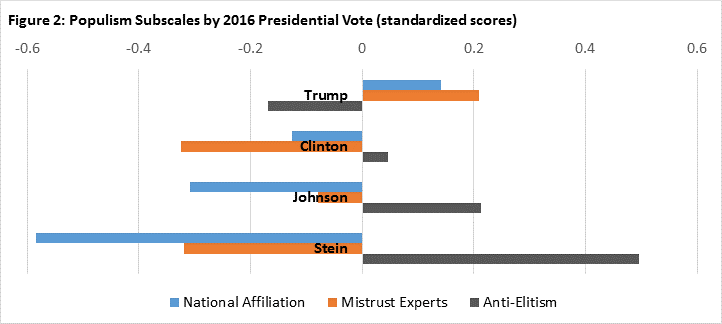
Our examination of populist ideas among Republicans who voted for Trump, compared to other Republicans, supported the idea that anti-elitism may be a mutable measure of disenfranchisement. Among Trump’s party, the general patterns we observed in the three subscales held (Figure 3). Trump-voting Republicans scored significantly higher on mistrust of experts and nationalism, compared to Republicans who voted for some other candidate, and scored significantly lower on anti-elitism compared to others.
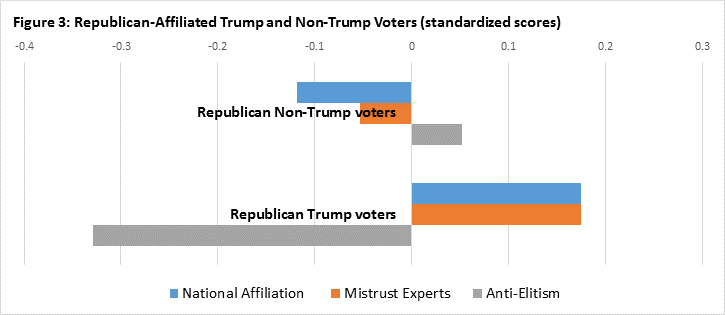
Belief in Evidence-Based Statements
We were also interested in exploring the association between populism and likelihood of agreeing with or rejecting information. We asked our panel respondents to rate as true, probably true, probably false, or false a list of eight statements reflecting some of the claims made by campaigns during or immediately after the election. We chose statements that were supported or refuted by governmental sources or peer reviewed scientific reports. Examples of items included “From 2008 to 2016, more than 9 million jobs were added to the US economy”, “In 2016, the likelihood of an American being killed by a Muslim extremist was one in six million”, and “Two million fraudulent votes were cast in the 2016 presidential election.” If the respondent indicated that the statement was false, a follow-up question asked whether they felt the number was too high or too low, to help us assess the direction of disagreement.
Our findings indicate deep divisions in perception between Trump and Clinton voters (Figure 4). Clinton voters were more likely than Trump voters to align with expert opinion on all but one of the statements. The statements that divided voters most deeply regarded Russian attempts to influence the election, and whether or not nine million jobs were created between 2008 and 2016. Majorities of both candidates’ voters agreed with experts that Trump’s claim that 2 million fraudulent votes were cast in the election is false. Trump voters were more likely than Clinton voters to agree with official estimates of the number of unauthorized immigrants in the U.S.
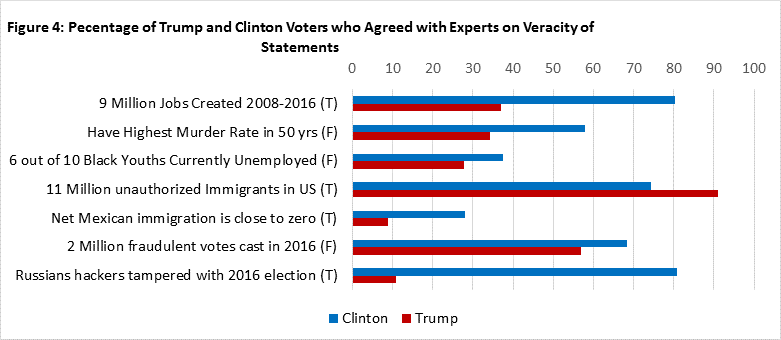
A similar pattern was observed for those affiliated with Republicans and Democrats. However, Republicans who did not vote for Trump were significantly less likely to discount the expert consensus. The greatest difference was found in the assessment of the veracity of a statement that nine million jobs were created in the Obama years. Six out of 10 Republican non-Trump voters said it was true, compared to nearly the same proportion (58%) of Trump-voting Republicans who said it was false. Non-Trump Republicans were more likely to agree with experts in every case, particularly about whether Russian hackers attempted to influence the outcome of the 2016 election.
A measure summarizing number of disbelieved evidence-based statements was distributed unevenly across the US (Figure 5), generally following the same pattern as the mistrust of experts subscale.
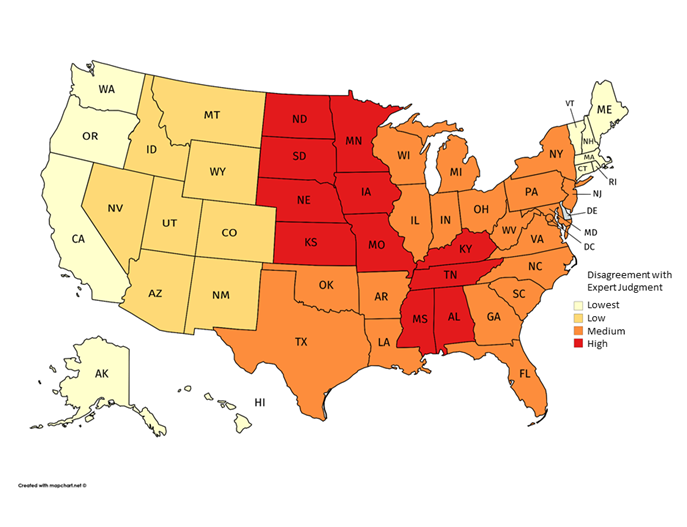
A recent study of more than 800 general elections in 20 advanced economies around the world found that, in general, voters tend to polarize and shift toward supporting populist candidates after a serious economic crisis (Funke, Schularick, & Trebesch, 2016). By the time the 2016 election was underway, the United States was well into a varied recovery that left many behind, particularly those in blue collar, low-income areas hit by loss of jobs to other countries and to automation. Indeed, Trump was not the only presidential candidate for the 2016 nomination for whom populist rhetoric resulted in levels of support that surprised pundits and more established candidates. Bernie Sanders very nearly upended Hillary Clinton’s bid for the Democratic nomination from the left side of the political spectrum with his own brand of ordinary-people populism.
Our findings are suggestive that one element of populism – the aggrieved sense that the system is rigged against the individual and little can be done to affect the way that government runs – may be mutable, and may flip when a populist candidate is elected. Perhaps not surprisingly, Trump voters, who tended to rate higher on the mistrust of experts subscale than Clinton voters, were also more likely to hold beliefs that were not in accord with expert opinion. We plan to continue to track these metrics over time, across the course of the Trump presidency.
[1] Our sample included national panel members who participated in Understanding America Study surveys UAS76, UAS88, and UAS91 between November 2016 and March 2107. The sample of respondents who participated in all three surveys was weighted to account for design effect and non-response. Question wording and detailed methodology, are available online at https://uasdata.usc.edu.

You must be logged in to post a comment.